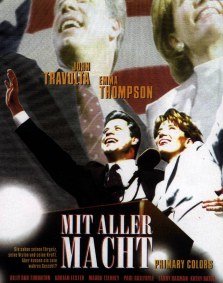 Screenplay
by Elaine May based on the novel by Anonymous.
Screenplay
by Elaine May based on the novel by Anonymous.Directed by Mike Nichols.
Primary Colors (1998)
Starring Adrian Lester, John Travolta, Emma Thompson, Kathy Bates,
Billy Bob Thornton, Maura Tierney, Paul Guilfoyle, and Larry Hagman.
 Screenplay
by Elaine May based on the novel by Anonymous.
Screenplay
by Elaine May based on the novel by Anonymous.
Directed by Mike Nichols.
Grade: B
Review by Carlo Cavagna.
If American culture and politics "Inside the Beltway" bore you, Primary Colors is probably just the sort of film you would avoid. It would be a shame, however, because Primary Colors is a highly enjoyable satire of Bill Clinton and his 1992 campaign for the presidency. Primary Colors follows Henry Burton (Adrian Lester) as he vacillates between keeping his Congressional job and joining Jack Stanton's presidential campaign in New Hampshire. While trying to decide, he finds himself swept along by Bill and Hillary Clin--er, I mean Jack and Susan Stanton--and their team, played by Paul Guilfoyle, Maura Tierney, and Billy Bob Thornton (as the James Carville parallel).
As the New Hampshire primary nears, a Gennifer Flowers-like character emerges to declare that she and Jack Stanton have had a longstanding affair, and nutty Libby Holden (Kathy Bates) is brought in to help with the damage control. After that, the Stanton campaign must deal with further adversity and Primary Colors becomes more and more fictional, until finally the tables are turned and Jack Stanton must decide whether to reveal embarrassing information about his opponent. Ultimately, Primary Colors poses a serious question--the same question being faced by the American public in the wake of the Lewinsky scandal--should we care about the personal flaws of our elected representatives? It's a complicated issue, and Primary Colors avoids easy answers.
John Travolta portrays Jack Stanton as a sexaholic boor, but when the camera is on him, he is virtually indistinguishable from Bill Clinton. This contrast is the source of much of the humor. Emma Thompson, as Susan, is hilarious as she struggles to keep the campaign together and her husband under control. Obviously, she represents Hillary Clinton, and we're meant to think that the real Hillary could well be much like Susan Stanton.
Occasionally Primary Colors takes the wackiness too far. For example,
Libby Holden's character is largely unnecessary. Her main functions appear to
be to behave erratically and give Jack Stanton lectures in ethics. In an unsuccessful
effort to make Libby Holden a believable character, Primary Colors tells
us that she's been in and out of mental institutions. A far defter satirical
touch is the sound of Jack pulling up his zipper immediately after Henry comes
into the men's room to inform him that he may have impregnated an underage girl.

Primary Colors is a good movie, but it is also a Hollywood movie. It can't resist spelling out its message, just in case you didn't understand it. It can't resist giving us lectures in civics, primarily through Libby Holden, even as it wrestles with ambiguous morality. In one incident, Henry Burton vomits after offering money to a family in exchange for its silence about Jack Stanton's behavior. This scene is unnecessary. We can see on our own that Henry is uncomfortable with the nauseating offer; we don't need to see an improbable scene of him throwing up by the side of the road.
Yet while Primary Colors drives home the messages it believes we should take from it, it leaves a critical point unclear: why is Henry Burton so drawn to Jack Stanton? John Travolta plays him like a jackass, showing little of his personal appeal. Henry says at one point, in explaining his decision to join Stanton's campaign, "I'd rather be with a lair who believes the things that I believe." But how does Henry know that Jack Stanton believes the things that he believes? How was he able to discern the difference between a liar who's just a consummate fake and a good man who only lies to get elected because he must?
We are constantly shown that Henry is uncomfortable, but we don't really understand his motivation for staying, other than the desire to win. Perhaps the problem is that, like Libby Holden, Henry Burton is not a real character. We can't understand his motivations because he doesn't really have any. He's just a necessary vehicle through which we can observe the Stanton campaign, and Henry's uneasiness represents the uneasiness we should be feeling. Through Henry, Primary Colors is telling us what to think, rather than letting us judge Jack Stanton--and thus Bill Clinton--for ourselves.
Despite a bit of Hollywood lecturing, director Mike Nichols never allows Primary Colors to get bogged down in a moralistic morass. True to form, he keeps the story moving and the audience engaged, as well as amused. Primary Colors was probably released too early in 1998 to have much Oscar momentum, but it will undoubtedly be represented at the Academy Awards, perhaps with a nomination for Travolta as Best Actor. [Ed. note: Kathy Bates was nominated for best supporting actress, and the only other nomination received by Primary Colors was for best adapted screenplay.]
Review © February 1999 by AboutFilm.Com
and the author.
Image © 1998
Universal Studios.
Send us a comment on this review. We'll post a link to the best comments!